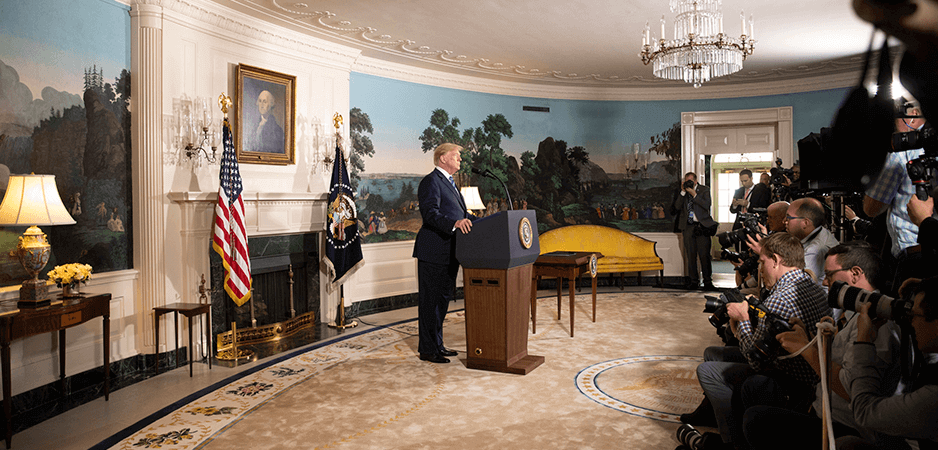Reconsidering the logic of economic specialization in the context of trade wars.
Commenting on Donald Trump’s penchant for starting trade wars, which he sees as the sign of a return to mercantilist thinking, former US diplomat Gary Grappo, writing for Fair Observer, reminds us that “[Adam] Smith and [David] Ricardo, as well as economists who followed, argued that by specializing in what it does well and continuing to perfect itself in that area, a nation can not only trade more but grow in wealth.”
Here is today’s 3D definition:
Specializing:
Investing in narrowly defined expertise to enrich the commonwealth while impoverishing oneself
Contextual note
Grappo quotes trade historian Craig VanGrasstek on how the powerful nations in the aftermath of World War II established what is often referred to as a “rules-based” world order: “[T]he time seemed right to establish a new world order based on inclusiveness and the rule of law.” The Daily Devil’s Dictionary has already raised the question of whether the economy is “rules-based” or “rule-based” (the result of one nation’s ruling over the others). We addressed this very question on June 13 when analyzing the “spat” between Donald Trump and Justin Trudeau.
Industrial age capitalism did indeed draw its major strength and principle of growth from the principle of specialization. This notion connects, philosophically and semantically, with the doctrine of the division of labor, a term coined by Adam Smith. This, in turn, suggests a relationship with other phenomena we associate with the modern economy: the drift toward monopoly (specialization being the water in the “moat,” so admired by Warren Buffett, that protects companies from competition); the fragmentation of power within the marketplace (where mass consumption renders every individual consumer invisible); and the widespread social and cultural fragmentation and isolation induced by the enforced focusing of individuals on their particular function in the socioeconomic machine.
The specialization principle at the core of industrial capitalism has produced a remarkable material enrichment, particularly for those groups of people who have been able to use it to their advantage. It also introduced and maintained a process of cultural impoverishment (alienation or what author David Harvey calls “a diminished “sense of wholeness or personal authorship”) that its admirers often fail to acknowledge.
Historical note
As with all types of inevitable “historical logic,” the conclusions reached by the classical economists turned out to be absolutely true, one might say, to a fault. Specializing and exchanging made it possible to perfect the arts and crafts of the preindustrial period with an effect of technical enrichment, expansion of activity and ever-increasing efficiency. One of the fruits of that enrichment was industrialization itself, the growth of manufacturing, which turned into a way of life that thrived on increasing production, logistics, distribution and consumption.
The existential question the world finds itself faced with turns around the question of manufacturing, the linchpin of an economy structured around the notion of specialization. Over three centuries, the industrialized West transformed a culture built around of arts, crafts and intellectual endeavor (science, historical knowledge, philosophy) into a complex circulatory system for the manufacture and distribution of products. This, in turn, spawned a secondary culture of services linked to the distribution and exploitation of products. We called it the “consumer society.”
When you’re almost 800 Billion Dollars a year down on Trade, you can’t lose a Trade War! The U.S. has been ripped off by other countries for years on Trade, time to get smart!
— Donald J. Trump (@realDonaldTrump) June 2, 2018
Cultures are powerful but largely invisible forces — transmitted by habit and spontaneous exchange — that implant and nourish standard (and, therefore, rarely questioned) ideas in people’s minds. The consumer society conditioned everyone’s mind to rotate around the idea that manufacture of goods represented the stabilizing fulcrum of the economy.
The current existential crisis that has fueled populist movements across the globe seeks, consciously or unconsciously, to place manufacturing back at the center of our national economic systems. The key word is “jobs,” partly because politicians believe that if they can produce jobs, which in turn guarantee subsistence, all will be well. But the nature of jobs has changed largely because the notion of “service” is not only elusive, because of the range it covers, but appears in people’s minds to be opposed to manufacturing. It lacks concreteness. The basic association with the word job is still “factory job.”
There is a semantic reason for this. If, as we have seen, specialization defines the modern economy, the notion of service seems too broad to embrace or epitomize specialization. This is false, of course, because services generally require complex and highly focused skills, including human communication. The other problem with service is that — contrary what Smith affirmed — it doesn’t appear to most people add to the “wealth of nations,” if only because service can’t be stocked and resold. In the consumer society, you possess the goods that you buy. The services disappear into thin air.
Capitalism has exported the bulk of manufacturing to distant lands where wages are low. After pursuing specialization through the investment in a university degree, in practice young people increasingly end up “specialized” in serving fast food or supporting themselves by driving for Uber.
It’s time we start thinking about what happens after the natural withering of the specialization that gave us the industrial and then consumer economy.
*[In the age of Oscar Wilde and Mark Twain, another American wit, the journalist Ambrose Bierce, produced a series of satirical definitions of commonly used terms, throwing light on their hidden meanings in real discourse. Bierce eventually collected and published them as a book, The Devil’s Dictionary, in 1911. We have shamelessly appropriated his title in the interest of continuing his wholesome pedagogical effort to enlighten generations of readers of the news.]
The views expressed in this article are the author’s own and do not necessarily reflect Fair Observer’s editorial policy.
Photo Credit: The White House
Support Fair Observer
We rely on your support for our independence, diversity and quality.
For more than 10 years, Fair Observer has been free, fair and independent. No billionaire owns us, no advertisers control us. We are a reader-supported nonprofit. Unlike many other publications, we keep our content free for readers regardless of where they live or whether they can afford to pay. We have no paywalls and no ads.
In the post-truth era of fake news, echo chambers and filter bubbles, we publish a plurality of perspectives from around the world. Anyone can publish with us, but everyone goes through a rigorous editorial process. So, you get fact-checked, well-reasoned content instead of noise.
We publish 2,500+ voices from 90+ countries. We also conduct education and training programs
on subjects ranging from digital media and journalism to writing and critical thinking. This
doesn’t come cheap. Servers, editors, trainers and web developers cost
money.
Please consider supporting us on a regular basis as a recurring donor or a
sustaining member.
Will you support FO’s journalism?
We rely on your support for our independence, diversity and quality.






